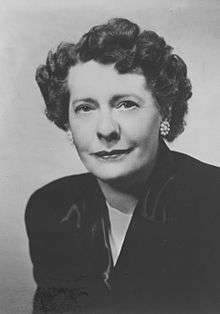Florence P. Dwyer
Florence Price Dwyer (July 4, 1902 – February 29, 1976)[1] was an American Republican Party politician who represented much of Essex County, New Jersey in the United States House of Representatives from 1957 to 1973. From 1967 to 1973, she also represented parts of Union County, New Jersey.
Flo Dwyer | |
|---|---|
 | |
| Member of the U.S. House of Representatives from New Jersey | |
| In office January 3, 1957 – January 3, 1973 | |
| Preceded by | Harrison Williams |
| Succeeded by | Matt Rinaldo |
| Constituency | 6th district (1957–67) 12th district (1967–73) |
| Personal details | |
| Born | July 4, 1902 Reading, Pennsylvania, U.S. |
| Died | February 29, 1976 (aged 73) Elizabeth, New Jersey, U.S. |
| Political party | Republican |
| Education | University of Toledo (B.A.) Rutgers University, Newark (J.D.) |
She was the second woman to be elected to the United States House of Representatives from New Jersey. She was the first woman Republican from New Jersey elected to the House. Dwyer was an advocate for women's rights throughout her political career.
Early life and education
Dwyer was born Florence Louise Price in Reading, Pennsylvania. She went to public school in Reading and Toledo, Ohio after moving there. Dwyer later moved to Elizabeth, New Jersey. She took courses at Rutgers Law School and became State Legislation Chairman of the New Jersey Federation of Business and Professional Women.[2]
Political career
Dwyer served as an alternate delegate to the Republican National Convention in 1944 and 1948. She was then elected to the New Jersey General Assembly, where she served from 1950 to 1956. Assemblywoman Dwyer introduced the Equal Pay for Equal Work bill, which was passed in 1952. The bill criminalized "discrimination in the rate of wages on the basis of sex" and later became a model for federal legislation.[3]
In 1956, Dwyer was elected to the United States House of Representatives for the first of eight terms.[4] In 1962, she co-sponsored the Equal Pay Act, which was passed the following year. In 1970, she helped Representative Martha W. Griffiths to bring the Equal Rights Amendment to the floor of the House after it had stalled in committee decades earlier. The amendment, originally drafted by Alice Paul in 1923, passed in the House and Senate, but its deadline for ratification passed without approval by the required number of state legislatures. The ERA has since been reintroduced dozens of times without success.
Dwyer voted in favor of the Civil Rights Acts of 1957,[5] 1960,[6] 1964,[7] and 1968,[8] as well as the 24th Amendment to the U.S. Constitution and the Voting Rights Act of 1965.[9][10]
Dwyer was not a candidate for reelection in 1972.[11] She retired to Elizabeth where she died in 1976. Her body is interred at St. Gertrude's Cemetery, Colonia, New Jersey.[12]
Quotations
- "A Congresswoman must look like a girl, act like a lady, think like a man, speak on any given subject with authority and most of all work like a dog." - On gender in politics[13]
- "Passage of a meaningful equal pay bill will end a long and unfortunate pattern of discrimination against women and it will place the Federal Government in the same desirable position as the 20 states which have enacted equal pay laws. It will help all areas of the economy, men as well as women, by stabilizing wage rates, increasing job security, and discouraging the replacement of men with women at lower rates of pay." - During the Congressional debate on the Equal Pay Act[14]
References
- "DWYER, Florence Price". house.gov. Retrieved 25 February 2020.
- "DWYER, Florence Price". house.gov. Retrieved 25 February 2020.
- "DWYER, Florence Price". house.gov. Retrieved 25 February 2020.
- "DWYER, Florence Price". house.gov. Retrieved 25 February 2020.
- "HR 6127. CIVIL RIGHTS ACT OF 1957". GovTrack.us.
- "HR 8601. PASSAGE".
- "H.R. 7152. PASSAGE".
- "TO PASS H.R. 2516, A BILL TO ESTABLISH PENALTIES FOR INTERFERENCE WITH CIVIL RIGHTS. INTERFERENCE WITH A PERSON ENGAGED IN ONE OF THE 8 ACTIVITIES PROTECTED UNDER THIS BILL MUST BE RACIALLY MOTIVATED TO INCUR THE BILL'S PENALTIES".
- "S.J. RES. 29. CONSTITUTIONAL AMENDMENT TO BAN THE USE OF POLL TAX AS A REQUIREMENT FOR VOTING IN FEDERAL ELECTIONS". GovTrack.us.
- "TO PASS H.R. 6400, THE 1965 VOTING RIGHTS ACT".
- "DWYER, Florence Price". house.gov. Retrieved 25 February 2020.
- "Florence Price Dwyer". findagrave.com. Retrieved 25 February 2020.
- "Women in Congress - Quotes". Archived from the original on 29 July 2012. Retrieved 30 November 2014.
- "Equal Pay Act - Quotations from the Congressional Debate". Archived from the original on 2006-09-24. Retrieved 2006-11-12.
External links
- United States Congress. "Florence P. Dwyer (id: D000587)". Biographical Directory of the United States Congress.
- Florence P. Dwyer at Find a Grave
- Inventory to the Records of New Jersey Federation of Business and Professional Women, 1919-1998
| U.S. House of Representatives | ||
|---|---|---|
| Preceded by Harrison Williams |
Member of the U.S. House of Representatives from New Jersey's 6th congressional district 1957–1967 |
Succeeded by William Cahill |
| Preceded by Paul Krebs |
Member of the U.S. House of Representatives from New Jersey's 12th congressional district 1967–1973 |
Succeeded by Matt Rinaldo |